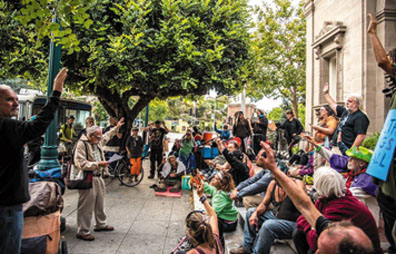by Steve Pleich
For several weeks, a group of concerned citizens has been meeting to strategize ways to move forward in support of the right to sleep in Santa Cruz. The group includes members of the faith community, civic leaders, advocates for people experiencing homelessness, nonprofit executives and Santa Cruz City Councilmembers Micah Posner and Don Lane.
Lane, the former mayor of Santa Cruz, describes the city’s existing ban on camping and sleeping by saying, “These are rules that protect the community against voluntary behaviors that either cause harm or have the potential to cause harm. Still, I do wonder what the harm is from the act of sleeping or wrapping oneself in a blanket on a cold night. And, more importantly, I wonder what the harm is when a government penalizes people for behavior they cannot and should not avoid.”
The group plans to introduce an amendment to Section 6.36 of the Municipal Code (Camping) to remove reference to the act of sleeping and the use of blankets. Among the talking points developed for the campaign to generate broad community support for the proposed amendment are the following:
(1) Santa Cruz does not need a sleeping prohibition in its camping ordinance to effectively manage our public and private spaces.
(2) All the activities that trouble so many community members, including dirty campsites and long-term occupation of locations within parks and greenbelts, are fully addressed in other provisions in the Camping Ordinance, along with ordinances on littering, public urination/defecation, trespassing and hours of use in parks.
(3) Santa Cruz’s ban on sleeping outside has not been an effective tool in reducing the number of homeless individuals in the city, even with one of the most restrictive sleeping laws in California.
This new initiative comes at a time when federal agencies are closely scrutinizing cities and towns that continue to enforce camping/sleeping bans in the absence of adequate and available shelter. [See “In the Shadow of Bell v. Boise,” January 2016 Street Spirit online edition].
When the winter shelter program ends in March or April, the city of Santa Cruz will literally have only a handful of beds available for the hundreds of individuals in the community without shelter. In other words, adequate shelter space does not exist. The existing ordinance would, in the opinion of the U.S. Department of Justice, be criminalizing some people simply because they are homeless.
Additionally, the U.S. Department of Housing and Urban Development (HUD) is now telling local communities that their applications for federal funding will be scored lower if the criminalization of involuntary acts such as sleeping outside is part of local policy.
Says Santa Cruz Housing NOW founder Linda Lemaster, “As a housing advocate, I fear that the current policies in our community prohibiting sleep may jeopardize the more than $2 million Santa Cruz receives annually from HUD.”

It is also notable that bans on sleeping are now being roundly criticized from a purely economic perspective.
Scott Keyes, senior reporter for ThinkProgress.org, writes, “Criminalization policies are problematic not only from a human rights perspective, but also because they’re costly and counterproductive. Criminalizing homelessness also hurts taxpayers. When accounting for law enforcement and emergency health care costs, numerous studies have found that leaving homeless people on the streets winds up costing taxpayers more than three times as much as simply giving them housing and supportive services.”
In addition, the United Nations Human Rights Committee has acted to condemn the criminalization of homelessness in the United States: “While appreciating the steps taken by federal and some state and local authorities to address homelessness, the Committee is concerned about reports of criminalization of people living on the street for everyday activities such as eating, sleeping, sitting in particular areas etc.”
This statement echoes the concerns of Santa Cruz attorney and longtime homeless activist Ed Frey who says, “Sleeping is and has always been a human right that should be protected and defended by international convention. The time is right for a full-throated advocacy of that right at the highest levels.”
Santa Cruz City Councilmembers Micah Posner and Don Lane hope to have the proposed amendment agendized for council consideration next month.
Until then, efforts will continue to actively lobby business and community groups in support of the proposal as sound economic and public policy — as well as a call to conscience for the entire community.
Steve Pleich is an advocate for the right to sleep in Santa Cruz.
